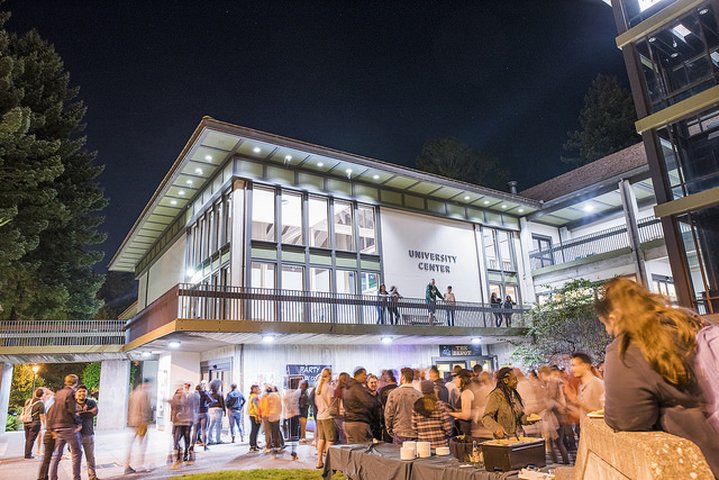
University Center at HSU. | Image via Humboldt State University.
# # #
Like virtually everything here in pandemic-riddled 2020 America, Humboldt State University finds itself in the midst of dramatic change and profound uncertainty. The school is contending with declining enrollment, a huge budgetary shortfall and, of course, COVID-19, which has reshaped nearly every aspect of campus life. (Virtual instruction begins Aug. 24 with limited face-to-face classes starting on Sept. 8.)
With all this disruption to the status quo, last week’s HSU press release titled “Changes Underway at UC to Enhance Campus Life” probably sounds unremarkable to anyone not directly involved with the “UC” in question — namely, the nonprofit University Center, which manages student dining, CenterArts, Center Activities and other programs. No local media outlets published the release. [Correction: My former North Coast Journal colleague Bob Doran published the release on his blog and the Mad River Union published a story Wednesday.]
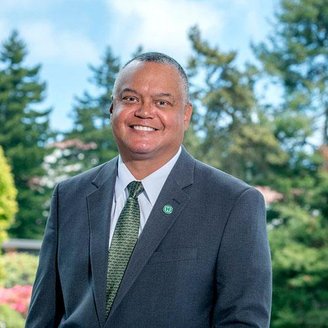
HSU President Dr. Tom Jackson, Jr.
Behind the scenes, though, the organizational changes described in that announcement have caused something of a constitutional crisis between the university and the UC. At a UC board meeting last week, several board members accused HSU President Dr. Tom Jackson Jr., who’s entering the second year of his tenure, of overstepping his authority, in part by unilaterally seeking to outsource campus dining services to the private, for-profit corporation Aladdin Food Services.
There have also been personnel shakeups. Two key administrators — HSU Vice-President for Administration and Finance Doug Dawes, who had oversight of the UC, and UC Executive Director Dave Nakamura — are gone. Dawes unexpectedly “stepped down” from his position on July 20, according to a statement from the university. Ten days later the university released another statement saying simply, “Effective today, Dave Nakamura is no longer serving as the Executive Director of the HSU University Center. We thank Dave for his 27 years of service and leadership at HSU.”
(Quick explanatory note here: Nakamura’s employment arrangement was unusual by some standards but typical among CSU auxiliary organizations like the UC: He was officially employed by HSU, and the UC reimbursed the university for his salary. Nakamura’s level of position, known as management personnel plan, or MPP, allowed the HSU president to fire him at any time.)
Almost immediately after learning of Nakamura’s termination, longtime UC board member Gregg Foster quit, as did Scott Gerving, the organization’s information technology manager.
While HSU has oversight authority, the University Center is a separate legal entity known as an auxiliary organization. Across the 23-campus California State University system there are more than 80 auxiliaries responsible for such essential functions as student bookstores and housing along with recreation, philanthropy and more.
The University Center at HSU, established in 1970, is organized as a nonprofit public benefit corporation, and it’s governed by a 14-member board of directors, half of whom are students. The board also includes representatives from administration, faculty and alumni, plus a community liaison. (Foster, the executive director of the Redwood Region Economic Development Commission, was appointed to the liaison position in 2013 by former HSU President Rollin Richmond and reappointed twice by Richmond’s successor, Lisa Rossbacher.)
HSU administrators say the changes being made to the UC will potentially increase revenues while improving the student experience, in part by creating more space for student clubs and organizations. (There are plans to relocate the bookstore from the UC building, overlooking the quad, to Jolly Giant Commons, a student housing facility at the north end of campus.) They also argue that outsourcing dining services will lower student food costs and improve service.
Aladdin employees have already started working at HSU, though a contract has yet to be signed. At President Jackson’s direction, Aladdin will serve as “consultants” for the 2020-21 academic year. Sometime next year there will be a competitive bidding process to select a vendor for a longer-term food service contract, to begin in fall 2021. HSU administrators say the UC board of directors will oversee that bidding process.
The sudden changes made to the UC are largely bureaucratic — a rearranging of the organizational flow chart that placed some new people in positions of authority and altered the path through which the UC reports to the university. Rather than reporting to Dawes, for example, Center Activities now reports to Athletics Department Director Jane Teixeira while CenterArts, the bookstore and dining services now report to Dr. Jason Meriwether, vice president for Enrollment Management. Notably, President Jackson’s July 13 memo explaining this reorganization was sent to HSU administrators but not to Nakamura.
It’s unclear what the long-term consequences will be, but these unexpected moves made during the summer break have sparked a variety of concerns among UC employees and board members, several of whom have described Jackson’s actions as a power grab.
Administrators say such accusations are categorically false and that many of the changes are coming in response to student feedback. In a press release issued Wednesday, the university announced that a number of “burdensome” student fees will be eliminated while approximately $500,000 in savings from UC management salaries will be reallocated to student programs and services.
The press release also notes that HSU has asked higher-ups in the California State University system to conduct “a thorough and deep review of the University Center’s revenue, expenditures, and business operations.”
Two institutions that are designed to work in concert for the benefit of students suddenly find themselves at odds, and pitched power struggle has ensued.
# # #
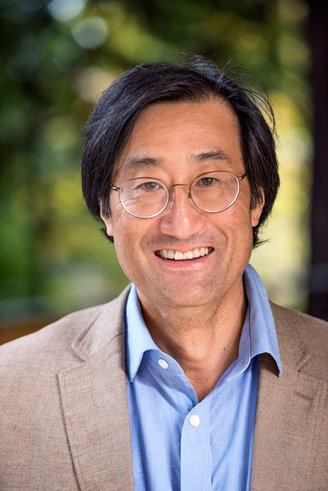
Nakamura
Nakamura’s sudden and unexplained departure came as a surprise to members of the UC board. A legal opinion provided a few days later by the UC’s attorney, Rex Randall Erickson of the San Diego-based Erickson Law Firm, offered some context.
“It is our understanding,” Erickson wrote, “that on July 9, 2020, HSU directed Mr. Nakamura to execute a contract with Aladdin Food Management Services … .” The contract was set to take effect on July 20, according to Erickson, who’s opinion goes on to say that HSU administrators brought in Aladdin without any consultation or involvement from the full UC board of directors, as required by law.
Robert Griffin, legal liaison for the CSU Auxiliary Organizations Associations, agrees that HSU administrators have overstepped their role. In an email sent to the Outpost on Thursday he said, “The HSU President and his key staff are engaged in an attempt to take direct operational control of the University Center (UC), a separate but related nonprofit corporation.”
While these administrators play a key role in making sure the UC stays within the law and satisfies the relevant policies, Griffin said, “the University leadership has dissembled the oversight role, circumvented the UC board of directors, and placed UC program, facilities and assets under university departments.”
According to three sources who spoke to the Outpost on the condition of anonymity, an emergency meeting scheduled for the night of Nakamura’s departure was canceled at the last minute by UC Board Chair Jourden Lamar (a student).
Later that evening, Foster submitted his resignation via email:
Dear Jourden,
I want to express my concern at this sudden firing of Dave Nakamura and other significant actions taken by the administration without consultation with the University Center Board of Directors. As you know, our organization has worked hard to provide quality services to the Humboldt State community while being responsible stewards of this organization.
It has become obvious to me that the administration does not see the UC Board of Directors as a partner worthy of consultation or respect. Making these major decisions without any collaborative discussion in the middle of summer is simply unacceptable.
It is clear to me that my role as community liaison is no longer valued. Therefore, I resign from the board effective immediately. I wish you and the rest of the members the best of luck.
Gregg
# # #
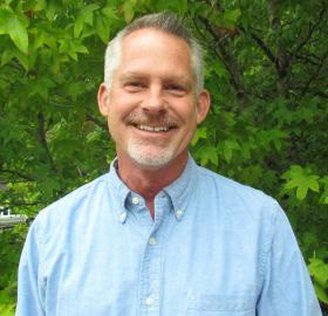
Larsen
With Nakamura gone, HSU administrators have selected his replacement. The “Changes Underway” press release issued last Tuesday explained that Todd Larsen, an employee from HSU’s department of Housing and Residence Life, will serve as acting executive director of the UC through Aug. 17. After that, the position will be filled by former HSU student government leader and UC board member Casey Park.
Last Tuesday, Larsen met with dining services employees to discuss the changes, including the arrival of Aladdin. In an audio recording of that meeting obtained by the Outpost, Larsen can be heard extolling the company’s assets.
“They’re working on a new website, an online nutrition thing,” he says. “They have online ordering, should we ever get to that. They have a lot of new features that they have up and running already. They can bring some new things to us and what we’re doing here.”
When Larsen asks if there are any questions, some workers express confusion and skepticism.
“The main thing I hear about from parents is [that] they like the selection of food they get here,” one says. “It’s not like all the other colleges. Nobody — it was like nobody had a say in this.”
The Dining Services website touts the existing program’s sustainability, the freshness of its food and its reliance on local vendors. One worker brought those attributes up.
“And you will only see that improve,” Larsen says. “It won’t get worse.”
He goes on to explain that the plan is for Aladdin to serve as a consultant this year and possibly be among the companies invited to participate in the university’s request for proposals (RFP), a bidding process for a long-term contract starting next year.
“So, what is the driving force behind opening this up to an RFP process?” a male employee asks.
“That really came from the president’s office [based] on feedback that he was getting from students, both on service, delivery and variety,” Larsen responds. “He [Jackson] had worked with the group that is coming in here, Aladdin, at his last university and was pretty impressed with what they did.”
Before coming to Humboldt, Jackson served nearly five years as president of Black Hills State University in South Dakota.
Another employee asks about benefits: “I know that one of the really attractive things working for the UC is the CalPERS [California Public Employees’ Retirement System] and the insurance, and it’s very likely that we’re going to lose that, right?”
“That could go away,” Larsen says. “It’s not a state corporation.”
Another employee chimes in: “I personally was somewhat surprised by this decision to move to Aladdin, and I was wondering if there’s any way we could become more informed on the president’s vision for the campus and what changes we might expect in the future.”
“That’s a good question for him,” Larsen responds.
“But we don’t know?” the employee asks.
“I don’t have the answer to that,” Larsen says.
# # #
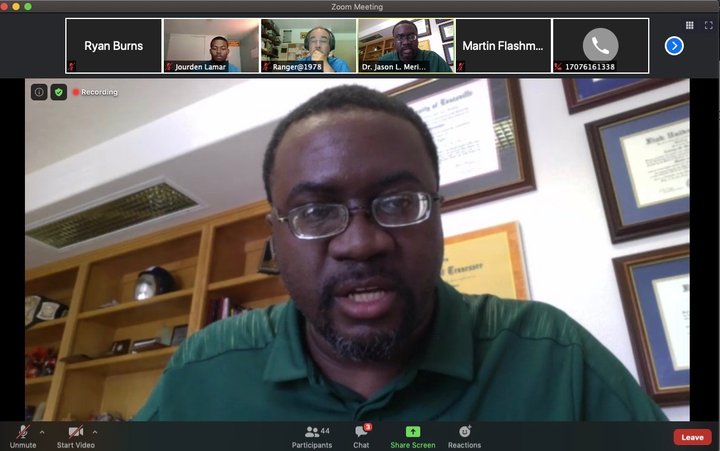
Dr. Jason Meriwether, HSU’s vice president for enrollment management. | Screenshot of the Aug. 4 Zoom meeting of the University Center Board of Directors.
Two days later, the UC board of directors held its first meeting since Nakamura’s departure (via Zoom, of course). HSU Vice President for Enrollment Management Dr. Jason Meriwether, attending his first UC board meeting since being assigned to his new oversight role, spent much of the meeting defending President Jackson’s actions.
Early on in the meeting, retired mathematics professor and former UC board member Martin Flashman said the changes “suggest that the university president is taking control of the University Center.” Flashman said the board should exercise its authority and decide for itself who the next executive director will be.
Another retired professor and former board member, Ken Fulgham, said there were efforts from previous HSU administrations to interfere with the UC’s authority. “I don’t agree with Martin most times, but I’ll agree with you tonight, that this is another outside hostile takeover,” he said. And he suggested the administration’s motives may be financial.
Meriwether denied this. “The revenue of the UC is designed to enhance the UC and the student experience and there is no interest, plan or willingness to try to take dollars from the UC to offset anything in university,” he said. “That simply isn’t the case.”
The changes to Dining Services, he said, are being made in response to student (and prospective student) requests for more options and “more concepts” with less complex pricing structures. He said President Jackson has instructed employees from Student Affairs and the Development Office to move out of Nelson Hall West and give that space to students. The plan, he said, is to “turn the UC [building] into a more active and robust student center because we can’t build one. …
“And simply stated, it’s not a power grab … ,” he continued. “This is about enhancing a student-first, student-centric experience.”
His assurances failed to appease the aggrieved attendees. UC faculty board member Dr. Steven Martin, chair of HSU’s Department of Environmental Science and Management, pulled out a copy of the Erickson Law Firm opinion.
“It’s clear [that] the actions taken by the president and his administrators were required to be done in consultation with — and in some cases even approved by — the University Center Board of Directors, none of which ever happened,” he said.
HSU administrators in attendance, including Meriwether and Associate Vice President of Student Success Steve St. Onge, argued that since no contract has been signed yet with Aladdin, the UC board’s authority remains unviolated.
“They’re here on a volunteer basis currently,” St. Onge said of Aladdin. “We’re working to get that consultation agreement in a place where we can present it to the UC attorney and the board for consideration.”
Martin countered that even if that’s true, Aladdin has still been given a valuable asset.
“If there’s going to be an RFP for a dining services contract starting a year from now, wouldn’t hand-gifting a free year of inside information to one hand-picked food service vendor give them an enormous competitive advantage over anybody else that might want to compete for that contract?” he asked. “That doesn’t seem right.”
Meriwether insisted that there will be “a fair and competitive bidding process” and he dismissed the Erickson Law Firm opinion, saying it misquoted him and was based on faulty premises.
The arguments went back and forth for nearly three hours without any apparent progress toward resolution.
The Outpost requested an interview with either President Jackson or Dr. Meriwether but we were told that neither was available. Nakamura declined to comment for this story.
On Tuesday we submitted a few questions to HSU’s Marketing & Communications office via email, and to our surprise, Meriwether provided written responses.
In response to a question about whether a contract has been signed with Aladdin yet, Meriwether wrote, “We are entering a one-year consulting agreement with Aladdin and the UC — an arrangement we’ve spent the last several weeks exploring — and will present the agreement to the UC Board.”
Responding to a rumor that the Humboldt Bay Aquatic Center in Eureka was removed from control of the UC, Meriwether said the offices of both the HSU Alumni Relations and HSU Foundation have been moved to that facility after being removed from Nelson Hall to free up more space for students on campus.
“We are exploring some space swaps to give students the premium placements … ,” he wrote, adding, “The Aquatic Center will continue to be the home of HSU Crew and of boating programs managed by Center Activities.”
# # #
Both the University Center and HSU’s management profess the same goal: enhancing student life on campus. And yet, over the past few weeks, their relationship has been more adversarial than symbiotic.
In yet another statement about the situation released Wednesday afternoon, HSU praises the UC, saying it “has done a great job over the years.” But the statement goes on to describe the wide array of changes being imposed on the organization and to defend the university’s authority to make those changes.
Judging by last week’s meeting, at least some of the remaining UC board members dispute that claim to authority, as do attorneys representing the organization. Meanwhile, the UC’s personnel has been diminished. According to the organization’s website, six of the 14 board of directors slots are now vacant, along with the position of executive director.
CLICK TO MANAGE